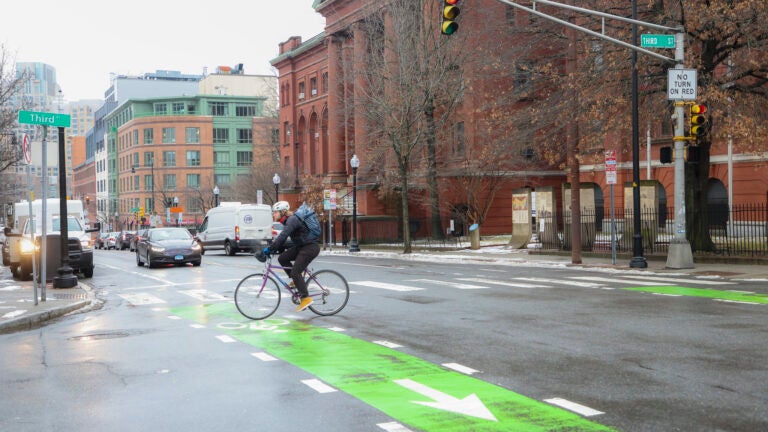Boston.com Today
Sign up to receive the latest headlines in your inbox each morning.

Following the deaths of three bicyclists in Cambridge and an outcry from residents, 22 miles of separated bicycle lanes will be delayed after the Cambridge City Council approved a six-month deadline extension.
Initially, Transportation Commissioner Brooke McKenna asked the City Council to approve a revised deadline from May 1, 2026 to Nov. 1, 2027 for parts of the Cycling Safety Ordinance, which passed in 2020. At a Cambridge City Council meeting on Monday, councilors amended that deadline to Nov. 30, 2026. The extension is to allow the city to mitigate the loss of parking due to the bike lanes.
The new deadline applies to completing continuous separated bicycle facilities along Main Street, Cambridge Street, and Broadway. Previously, the deadline to install separated bike lanes was already extended to November 2027 by the council in April. On Monday, the council shaved a year off that.
“At this point, because of the delays over the past year, we cannot meet the original May 2026 deadline,” McKenna said, but they could meet the Nov. 30, 2026 deadline.
More than 100 residents spoke during the public comment period, mostly about bicycle safety. Earlier this summer, two bicyclists were killed after being struck by box trucks in the city. Kim Staley, a 55-year-old from Florida, and Minh-Thi Nguyen, a 24-year-old student at Massachusetts Institute of Technology, were both hit when trucks going the same way as the cyclists turned into their paths. Both were on protected bike lanes.
John Corcoran also died while biking in Cambridge on Memorial Drive, which is operated by the Massachusetts Department of Conservation & Recreation.
“Everybody on the council wants to do everything we can to make things safer, but there are also other things to be considered, and that’s the small businesses in our community, the residents in the densest part of our city that are going to lose parking,” Councilor Paul Toner said.
An updated Parking and Transportation Demand Management ordinance was discussed at the meeting to mitigate parking spot loss through zoning. The PTDM projected a loss of around 800 to 900 parking spaces, but the proposed zoning could add up to 3,400 off-street parking spaces along the corridors.
McKenna also said there won’t be a loss of parking around the Newtowne Court public housing.
“We’ll do the same kind of thorough process along each corridor, with a lot of public outreach, a lot of business outreach to work out all of the best curb uses. We will give the same level of attention to the design details along the entire corridor, including intersections, regardless of which timeline we’re on,” McKenna said.
Some councilors questioned the delay of the infrastructure, but the delays will allow them to work with residents on parking changes, Deputy City Manager Owen O’Riordan said.
“There’s an impact on them as a result of the loss in parking, and we’re all very conscious of that, and so if we move that a bit faster, there’s a more significant immediate impact on them, and there’s less time for them to be able to adjust,” O’Riordan said.
Since 2023, there have been 110 crashes on Cambridge Street and 40 of those involved injuries – 20 with bicyclists and eight with pedestrians. Broadway had 93 crashes, 23 with injuries. Ten of those involved cyclists, and seven involved pedestrians. The stretch of Main Street targeted for bike lane infrastructure saw 13 crashes with three injuries, two of which involved bicycles.
With the PTDM, Councilor Jivan Sobrinho-Wheeler said the extension should only be six months.
“We have everything we need to do this by November 2026,” he said Monday. “I don’t see the need to wait an additional year after that and have more additional crashes and injuries that we’ve seen just in a year.”
Sign up to receive the latest headlines in your inbox each morning.